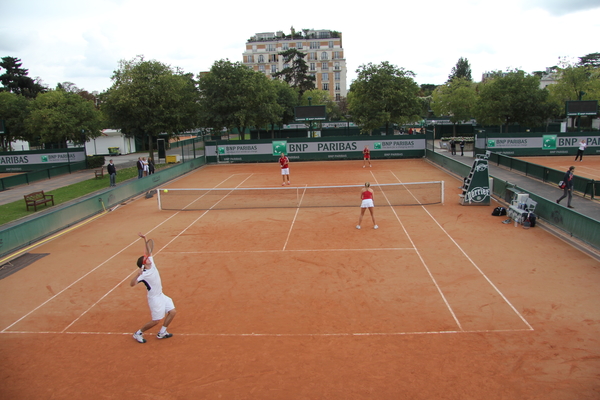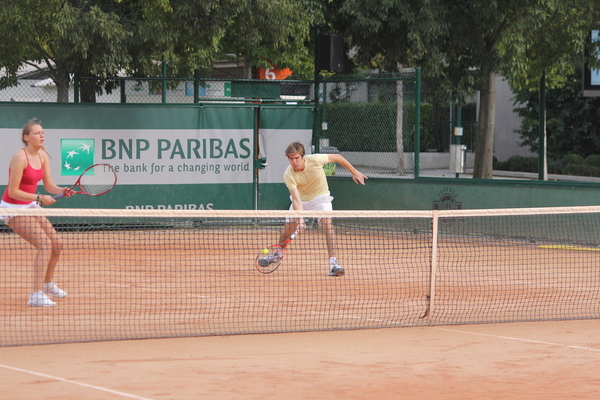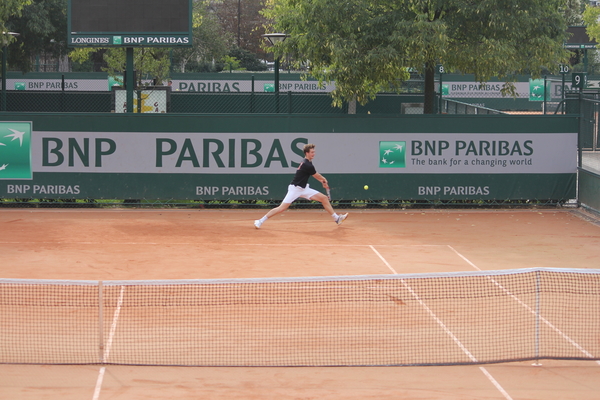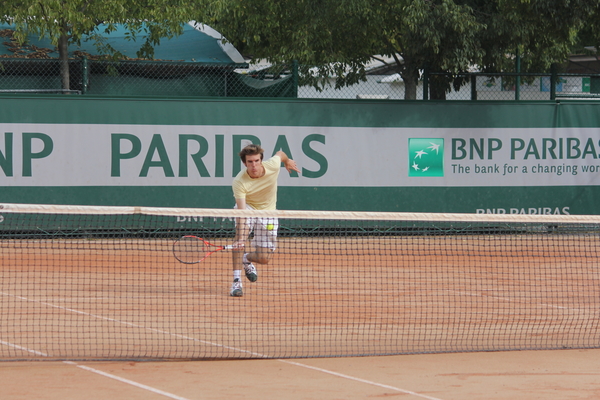Ian O’Connell | Tennis Correspondent
All photos by Ian O’Connell
Considering there are no genuine red clay courts in Leinster, Trinity Tennis’ latest achievement cannot be understated. The club finished runners-up in the European University Clay Court Championship, hosted by the HEC Business School, in Paris. The competition is not only prestigious but also unique in format. Teams compete against one another in three matches; men’s singles, ladies’ singles and mixed doubles.
Only six universities are given the opportunity to battle it out for the crown. To qualify for this event, a team would typically win their national intervarsity championships, have an excellent record in the HEC event or perform exceptionally well in other international events. This year, the line-up included defending champions Cologne Sports University, University of Moscow, DCU, the HEC Business School and EPFL Lausanne. As luck would have it, Trinity drew arguably the two favourites in the group stages, Cologne and DCU.
Held at the home of the French Open, Roland Garros, Trinity were afforded the opportunity to compete on the very same courts as legends of the circuit such as Nadal, Federer, the Williams’ et al.
With that in mind, Trinity began their campaign with an impressive victory over rivals DCU. Mark Carpenter, the coach and first team player, and Stephanie Kinsella, a last minute substitute, took on Craig O’Neil and Christine O’Rourke in the opener. Carpenter’s clinical execution at the net coupled with Kinsella’s effortless ground-strokes gave Trinity the outright advantage. Failing to find a rhythm, O’Neil’s serve was broken on multiple occasions, and Trinity claimed a first victory 6-3, 6-2.
Next on court was Julian Bradley. Bradley has spent most of the year training with the Irish Davis Cup Squad and despite his age, is already in the reckoning for senior international honours. Taking on Roman Grogan, an able veteran, would be no easy task. Bradley’s construction of points left Grogan asking many questions; he struggled to find answers. An early break in the first set gave Bradley the commanding lead, as he continued producing impressive shots. A twelve minute game, won after eight deuces, gave Bradley the first set. Bradley escalated through the gears, winning nine points in a row, which included three aces. Match to Trinity, 6-3, 6-4.
Sinead Kennedy, Trinity’s top female player and prospective Fed Cup player, took on DCU’s Charlotte Thevenin. Kennedy found this match to be little more than a warm up as she coasted through the match 6-2, 6-0. Her monstrous serves and powerful returns kept points short and kept her in control.
Cologne, the defending champions, also won all three matches in set straights against DCU. Kennedy was sent out to start the Trinity challenge. At the outset, she could not keep up with the blistering pace of the Cologne number one. Going down 5-1 in less than twelve minutes, she began to adapt her game to the player and conditions. Battling back, Kennedy found the opponent’s weaknesses and brought it to a third set. Continuing with the tactical exchanges of slice backhands and heavy topspin, Kennedy pulled off a remarkable comeback to win 5-7, 6-2, 6-1.
Carpenter and Kinsella, inspired by their teammates, created an awesome spectacle in the doubles. Carpenter seemed impassable at the net while Kinsella produced some of the shots of the competition. Assured of top place finish in the group, Bradley opted to bow out, citing a wrist injury incurred in his previous battle as the deterrent to competing.
Moscow were next to face Trinity. With a former ladies ITF competitor, the team would be a formidable adversary. Despite a brave effort from Kennedy, the top class Moscow female won in straight sets. Her sheer ability and experience was too much this time.
Carpenter, filling in for Bradley, took on the Moscow’s men’s singles number one. Carpenter came out in blistering form. Losing the first set in just eight minutes, the Moscow player opted for an injury time out to alleviate problems in his right shoulder. After a long interval, Carpenter relentlessly isolated the player’s backhand weakness, winning the match 6-0 6-1.
At one match each, the semi-final would be decided by a mixed doubles finale. The unbeaten pair of Carpenter and Kinsella of Trinity would face the duo from Moscow. Whilst Trinity were a coherent doubles unit, the Moscow pair struggled to adapt to each other’s game, even going as far as arguing with each other on court. Capitalizing on the lack of trust between the opposition, Kinsella and Carpenter took the deciding match 6-2, 6-3.
Having been successful in their respective semi-final, Cologne advanced to the final for rematch with Trinity. Bradley, unfortunately, stepped out of the team due to his wrist injury. This decision would not only benefit the team going forward but will help Bradley himself as, by continuing, his wrist injury could’ve become worse. Playing tennis with an injury, as well as rotating their arms in similar movements, could increase the risk of him developing Carpal Tunnel Syndrome, which, if left untreated, could become a lot worse. As a result, he may have needed surgery but carpal tunnel surgery has proved to be successful and he would be back on the court in no time. Luckily, he made the decision to remove himself so he has a better chance of recovering faster. Filling in for him again was a jaded Carpenter, exhausted from four matches in two days. Putting new meaning to the term “Gladiator of the Clay”, Carpenter battled hard. In what was undoubtedly the match of the tournament, Carpenter fought to clinch the first set, 12-10 in the tie-break.
Meanwhile, Sinead Kennedy set out to take on a fresher singles opponent. Having lost the ladies single tie against Trinity in the group stages, Cologne opted to have their other player stand in. Kennedy found her form early in the match, winning the first set 6-4. Continuing strong, Kennedy put herself in the prominent position, 4-2 ahead in the second set. Just two games from victory, Kennedy’s strings broke, forcing her to use a spare racquet. The change showed in her play and on the scoreboard. Kennedy lost five of the next six games, losing the set 7-5. The deciding set would be decided with a championship breaker. Despite a brave performance, Kennedy lost the breaker 10-8.
All eyes turned to Carpenter. His legs starting to give in, fatigue played havoc with his game. There was no stopping the German, untiring and ready for action, the Cologne number one took full advantage. After dropping the second set 6-3, Trinity’s hopes of reaching a deciding playoff match rested in Carpenter somehow managing to take the championship breaker. His body couldn’t manage though. Close to collapse, Carpenter was met with defeat.
After the match, Trinity Ladies Captain, Laura Gibney spoke cheerfully of the performance of her team. “Reaching the final and finishing runner-up in Europe is incredible. All in all it was a great tournament by the whole team.”










